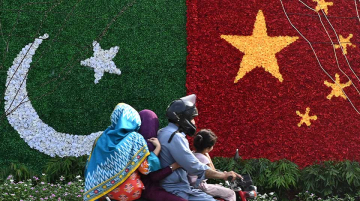
By Saniya Kulkarni
With all eyes on Beijing’s response to the ongoing protests in China, it appears Pakistani Prime Minister Shehbaz Sharif is making headway in mitigating growing unrest in the southwestern province of Balochistan. The resource-rich region is home to several major infrastructure projects under the China-Pakistan Economic Corridor (CPEC), including its flagship project, the Gwadar port. On an official visit to Ankara last week, Sharif invited Turkish President Erdogan to join the CPEC, suggesting the “wonderful joint cooperation” between China, Pakistan, and Turkey would usher in regional prosperity.
The invitation comes at a time of growing discontent for projects under CPEC amongst local Balochi communities. The port town of Gwadar made headlines recently due to protests led by Haq do Tehreek, a movement fighting for the rights of fishing communities in the coastal areas of Makran and Gwadar. The movement demands curtailing illegal fishing by Chinese trawlers breaching the maritime boundaries of Balochistan. Another major demand put forth by the movement was the scaling back of the presence of security forces in their town. The heavy militarization of Gwadar has been an issue of increasing discomfort for residents, who claim to feel dispossessed of their own land due to widespread security measures restricting free movement. This securitization has emerged in response to the threat faced by Chinese nationals working on BRI projects in the area, who have been a target for Baloch insurgents protesting the “exploitaition of their resources” by Chinese-financed undertakings.
Amidst growing discontent towards the BRI, Sharif’s initiative to bring Turkey aboard the CPEC may come as surprising, but it is likely an effort to address concerns regarding Pakistan’s financial reliance on China. By getting Turkey, one of its longest-standing friends, involved with the CPEC, Sharif appears to be achieving dual goals through the expansion of what was originally a bilateral project. On the one hand, there are mutual economic benefits that may have the potential to promote local interests, as well as assuage critical voices – especially those from the volatile Baloch region.
On the other hand, Sharif’s efforts towards diversifying foreign investment into Pakistan could be interpreted as a more sophisticated play in debt management by distributing risk.
Several of Gwadar’s problems arose after management of the port was taken over by the state-owned China Overseas Port Holding Company (COPHC) in 2013. The new agreement has enabled the COPHC to have a 91% share in gross revenue of marine operations as well as an 85% share in gross revenue from operations in the free zone. According to an in-depth report by AidData, Pakistan is the BRI partner with the highest number of projects affected by discontent and public protests, arising primarily from labor violations, environmental hazards, and loss or potential loss of livelihoods. Considering the fact it was Shehbaz Sharif’s older brother, former PM Nawaz Sharif, who spearheaded the effort to cooperate more closely with “all-weather friend” China and make CPEC a reality, the current PM is acutely aware of the narrative that could be spun against him in the current political climate in Islamabad.
Between the rising popularity of his predecessor and the herculean task of restoring the Pakistani economy following recent floods, the expansion of CPEC could be the answer to some of Sharif’s biggest challenges.
The call to Turkey, however, was not his first attempt towards the expansion of the multi-billion dollar project. There have been discussions to include Afghanistan in the partnership since mid-2022, also with the aim of boosting economic prosperity in the region. The idea, unsurprisingly, was met with vocal opposition from India, which has maintained since the conception of the CPEC that many of its infrastructural undertakings violate Indian sovereignty. One of the major projects connecting the westernmost Chinese province of Xinjiang with central Pakistan, the Karakoram Highway, passes through Gilgit-Baltistan, parts of which India claims as its own territory. Under former PM Imran Khan, Pakistan made no attempt to disrupt its status quo vis-a-vis India. Despite repeated statements reiterating his commitment to the Kashmir cause, Khan’s support remained confined to verbal affirmations. Khan was also notably critical of the CPEC before assuming power in 2018, and China has been conscious of the Pakistani military’s growing distrust of the PM towards the end of his tenure.
What distinguishes Sharif’s foreign policy from Khan’s is primarily his relationship with the ‘establishment’ – the legacy nexus of the ruling party and the military – as well as the making and breaking of regional ties. Sharif has expressed a desire to maintain “permanent peace” with India, and yet in his first few months as PM, has made moves to upset the already deteriorating relationship. By calling upon the international community to intervene and facilitate the resolution of the Kashmir issue, as well as attempting to accelerate the expansion of the CPEC, Sharif has already taken a clear stance on issues India regards as highly sensitive.
China has always been a proponent of including a wider network of partners in the CPEC and welcomed Pakistan’s decision to extend an invitation to Turkey. It might be worth noting that former PM Imran Khan had made a similar effort but was not met with the reciprocity he might have hoped for. It remains to be seen how Turkish involvement in the CPEC will play out, especially considering the looming presidential elections which will determine Erdogan’s fate. While there has been no reported progress on the most recent protests in Gwadar, it will not be surprising if protestors are met with the same response they received in 2021 – promises to alleviate the negative impact of Chinese projects on local livelihoods. There is growing public wariness towards the CPEC due to consistently failing agreements, and this unrest is not something Sharif seems to be taking lightly.
Saniya Kulkarni is a Project Coordinator at LSE IDEAS.








